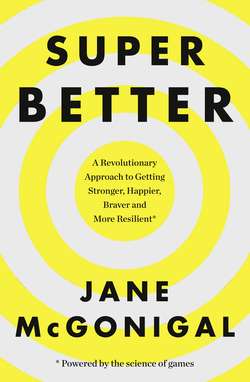Читать книгу SuperBetter: How a gameful life can make you stronger, happier, braver and more resilient - Jane McGonigal, Jane McGonigal - Страница 13
Оглавление4
You Can Make the Leap from Games to Gameful
Your Mission
Smash the boundaries that keep your gameful strengths separate from your real life.
So far we’ve looked at findings from more than one hundred scientific studies that reveal the natural gameful abilities we all possess: to control our attention, thoughts, and feelings; to connect and bond with virtually anyone; and to supercharge our willpower and determination.
But not everyone who plays games will succeed in translating these strengths from games to daily life. In fact, many gamers seem to suffer—academically, socially, or in their physical and mental health—as a result of excessive play, leading many to worry about “video game addiction.” How is it possible that some frequent game players benefit from play while others struggle?
It’s a paradox I’ve spent years researching, and I’m not the only one. Consider the following headlines. These are all actual results from peer-reviewed research on the impact of playing video games.
“Study Shows Videogames Linked to Depression and Lower Life Satisfaction”1
“Study Shows Frequent Gamers Experience Greater Levels of Happiness and Life Satisfaction”2
“Gaming Linked to Lower Grades, More Drug Use in Teenagers and College Students”3
“Video Game Play Linked to Higher Grades, Less Drug Use in High School and College Students”4
“Videogames Linked to Poor Relationships with Friends, Family”5
“Videogames Improve Family Relationships, Particularly Between Fathers and Daughters”6
It’s maddening, isn’t it? I’ve read literally hundreds of scientific papers on this topic, and many of them convincingly argue that playing games will make you more depressed, anxious, and socially isolated. But many more just as convincingly argue that playing games frequently will make you happier, healthier, and more ambitious, with stronger social support to boot.
It’s not that either group of researchers is wrong. They’re both right.
When you examine all the factors behind the diverging results, as I have, again and again you’ll come across one reason why only some gamers learn how to effectively apply these strengths in real-world contexts, such as work, school, health, or family. So what makes the difference?
It’s not, surprisingly, a matter of which games you play, or how much time you spend playing them. Instead, it depends entirely on why you play games.
Do you play to escape your real life, or do you play to make your real life better?
(If you’re not sure which you do, keep reading—this chapter will help you figure it out.)
If you typically play games to escape your real life—that is, to ignore your problems, to block unpleasant emotions, or to avoid confronting stressful situations—you will have a very difficult time translating your game skills to real life. An escapist approach to play really does increase depression, worsen social isolation, and make you less
